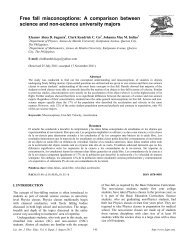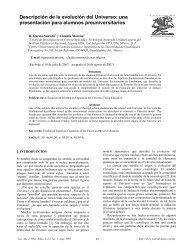A Study on Pre-Service Teachers' Information Literacy Abilities
A Study on Pre-Service Teachers' Information Literacy Abilities
A Study on Pre-Service Teachers' Information Literacy Abilities
You also want an ePaper? Increase the reach of your titles
YUMPU automatically turns print PDFs into web optimized ePapers that Google loves.
A <str<strong>on</strong>g>Study</str<strong>on</strong>g> <strong>on</strong> <strong>Pre</strong>-<strong>Service</strong> Teachers’ Informati<strong>on</strong><br />
<strong>Literacy</strong> <strong>Abilities</strong><br />
Bayram Akarsu<br />
School of Educati<strong>on</strong> Erciyes University Kayseri / Turkey<br />
Email: bakarsu@erciyes.edu.tr<br />
(Received 27 November 2010; accepted 25 January 2011)<br />
Abstract<br />
Every teacher candidates no matter what disciplines of teaching they study is supposed to acquire informati<strong>on</strong> literacy<br />
in order to enhance his/her future teaching activities and create more enjoyable atmosphere for the students. The<br />
present study investigates what levels of knowledge pre-service teachers enrolled in science educati<strong>on</strong> and primary<br />
school teacher preparati<strong>on</strong> programs possess regarding informati<strong>on</strong> literacy. The participants (N=144) were asked to<br />
complete the Informati<strong>on</strong> <strong>Literacy</strong> Questi<strong>on</strong>naire for <strong>Pre</strong>-service Teachers (ILIPT). Comparis<strong>on</strong> between students‟<br />
informati<strong>on</strong> literacy levels in two different teacher preparati<strong>on</strong> programs and potential causes are explicitly examined.<br />
The outcomes of this investigati<strong>on</strong> revealed that even though pre-service teachers possess adequate knowledge of<br />
informati<strong>on</strong> literacy, they still lack some of its aspects.<br />
Keywords: Informati<strong>on</strong> literacy, science educati<strong>on</strong>, early childhood educati<strong>on</strong>.<br />
Resumen<br />
Todo candidato a la docencia, sin importar la disciplina a enseñar, debe estar alfabetizado en el campo de la<br />
información para poder mejorar sus actividades de enseñanza futuras y crear una atmosfera más agradable para sus<br />
alumnos. El presente estudio investiga los niveles de alfabetización informaci<strong>on</strong>al que poseen los profesores en<br />
formación de los programas de Enseñanza de las Ciencias y de Educación Primaria. Los participantes (N=144)<br />
completar<strong>on</strong> el Cuesti<strong>on</strong>ario Alfabetización Informaci<strong>on</strong>al para Profesores en Formación (ILIPT). Comparaci<strong>on</strong>es<br />
entre los niveles de alfabetización informaci<strong>on</strong>al de alumnos de los dos diferentes programas y las causas potenciales<br />
s<strong>on</strong> examinados explícitamente. Los resultados de esta investigación revelar<strong>on</strong> que aunque los maestros en formación<br />
poseen c<strong>on</strong>ocimiento adecuado de manejo de la información, aun carecen de algunos de sus aspectos.<br />
Palabras clave: Alfabetización informaci<strong>on</strong>al, formación para enseñanza de las ciencias, educación primaria.<br />
PACS: 01.40.eg, 01.40.-d, 01.10.-m ISSN 1870-9095<br />
I. INTRODUCTION<br />
Elementary teachers holding adequate levels of informati<strong>on</strong><br />
literacy has been emphasized as an essential characteristic<br />
by European Uni<strong>on</strong> (EU) educati<strong>on</strong>al reforms and United<br />
States library associati<strong>on</strong> [1, 2]. Being an informati<strong>on</strong><br />
illiterate teacher negatively affects students‟ learning at<br />
various levels of educati<strong>on</strong>. The world changes fast so it is<br />
sometimes problematic for everybody to acquire new<br />
informati<strong>on</strong> from outside. This creates new types of<br />
problems for people especially teachers [3]. 20th century<br />
was known as „Informati<strong>on</strong> Age‟ and 21st century is<br />
„Informati<strong>on</strong> Processing Age‟ but in order to develop into<br />
an informati<strong>on</strong> literate pers<strong>on</strong>, <strong>on</strong>e needs to own sufficient<br />
amount of informati<strong>on</strong> to process.<br />
The term informati<strong>on</strong> literacy, sometimes referred to as<br />
informati<strong>on</strong> competency, is comm<strong>on</strong>ly defined as the ability<br />
to access, evaluate, organize, and use informati<strong>on</strong> from a<br />
variety of sources. Being an informati<strong>on</strong> literate pers<strong>on</strong><br />
requires knowing how to clearly define a subject area of<br />
investigati<strong>on</strong>; selecting the appropriate terminology that<br />
expresses the c<strong>on</strong>cept or subject under investigati<strong>on</strong>;<br />
formulating a search strategy that takes into c<strong>on</strong>siderati<strong>on</strong><br />
different sources of informati<strong>on</strong> and the variable ways that<br />
informati<strong>on</strong> is organized; analyze the data collected for<br />
value, relevancy, quality, and suitability; and subsequently<br />
turning informati<strong>on</strong> into knowledge [1]. It c<strong>on</strong>sists of a<br />
deeper knowledge of how and where to find informati<strong>on</strong>,<br />
how to judge whether that informati<strong>on</strong> is meaningful, and<br />
ultimately, how to incorporate informati<strong>on</strong> to address the<br />
problem or issue at hand. Informati<strong>on</strong> literacy has further<br />
definiti<strong>on</strong>s such as “The ability to access, evaluate,<br />
organize, and use informati<strong>on</strong> in order to learn, problemsolve,<br />
make decisi<strong>on</strong>s in formal and informal learning<br />
c<strong>on</strong>texts, at work, at home and in educati<strong>on</strong>al settings” [4]<br />
and skills to collect, evaluate, organize, and present<br />
informati<strong>on</strong> [5].<br />
Lat. Am. J. Phys. Educ. Vol. 5, No. 1, March 2011 162 http://www.lajpe.org
Bayram Akarsu<br />
The demand to evaluate the credibility of informati<strong>on</strong> is<br />
not new. However, until recently most learners could expect<br />
to handle some carefully selected collecti<strong>on</strong>s of reference<br />
materials in academic and public libraries. Furthermore,<br />
today a fairly limited range of widely is accepted<br />
authoritative texts in the classroom or in the home library.<br />
On the other hand, since any<strong>on</strong>e can make a Web page,<br />
for example, how can you tell if the informati<strong>on</strong> is reliable<br />
or not? A critical point about using the Internet is that<br />
individuals posting informati<strong>on</strong> are not required to pass<br />
through traditi<strong>on</strong>al editorial c<strong>on</strong>straints or undergo any kind<br />
of fact-checking required in c<strong>on</strong>venti<strong>on</strong>al published print<br />
media [6, 7]. The lack of enthusiasm to look for informati<strong>on</strong><br />
from tried and true sources such as well-indexed books or<br />
the temptati<strong>on</strong> to assign value to informati<strong>on</strong> simply<br />
because it came off of the computer will likely provide<br />
results with poor quality.<br />
Not <strong>on</strong>ly must we be discerning learners but also we<br />
must be c<strong>on</strong>stantly learning. As global change pace has<br />
increased, so has our need for learning. C<strong>on</strong>sider the<br />
tremendous changes in both the amount and variety of<br />
informati<strong>on</strong> resources, as well as great changes in<br />
technology that affects our lives in everything from banking<br />
to medical care. Change requires that we know more and<br />
learn more about the world around us. Yet several scholars<br />
such as Breivik and J<strong>on</strong>es [8] have found that the traditi<strong>on</strong>al<br />
literacy of reading, writing, and mathematical reas<strong>on</strong>ing are<br />
insufficient for lifel<strong>on</strong>g learning. The increasing amount of<br />
informati<strong>on</strong> from all sources and the pressure to remain in a<br />
c<strong>on</strong>stant state of c<strong>on</strong>scious learning means that we must be<br />
dexterous in the use of informati<strong>on</strong>, too. The need to handle<br />
and use informati<strong>on</strong> is present in all stages of life and the<br />
acquisiti<strong>on</strong> of the competencies of informati<strong>on</strong> literacy must<br />
be intertwined with the acquisiti<strong>on</strong> of the other literacy [9].<br />
Because becoming informati<strong>on</strong> literate is an active<br />
process, requiring the seeking out of knowledge from<br />
multiple sources rather than passively receiving and<br />
repeating back facts, the teacher's role must evolve from the<br />
giver of knowledge into being more of a coach or guide<br />
[10]. Teachers, professors, teaching assistants, librarians,<br />
administrators, and the community must collaborate to<br />
develop ways to involve the students into using not <strong>on</strong>ly in<br />
classroom materials but also resources from the broader<br />
community and the mass media. Some of our learning<br />
occurs in formal settings where what we learn is packaged<br />
and prepared for us. But much learning also occurs in n<strong>on</strong>formal<br />
settings, and, informally as well. Informati<strong>on</strong> literacy<br />
is crucial in all three types of learning situati<strong>on</strong>s.<br />
Becoming informati<strong>on</strong> literate will involve a drastic<br />
change from the way many students are used to learning.<br />
First of all, it requires students to be more self-directive in<br />
their learning. This kind of independent, active learning<br />
prepares students for real-life problem solving [11], Also, in<br />
becoming informati<strong>on</strong> literate, students will assume more<br />
resp<strong>on</strong>sibility for their own learning either individually or in<br />
work groups. As students become more competent with<br />
their use of informati<strong>on</strong> resource opti<strong>on</strong>s, they become<br />
aware of their individual styles of learning and preferred<br />
ways of assimilating knowledge [12].<br />
In order to produce learners who are informati<strong>on</strong> literate,<br />
schools will need to integrate informati<strong>on</strong> literacy skills<br />
across the curriculum in all subject areas beginning in the<br />
earliest grades. Educati<strong>on</strong>al instituti<strong>on</strong>s that wish to produce<br />
lifel<strong>on</strong>g learners should be engaged in some fairly basic<br />
rethinking of how teaching faculty and informati<strong>on</strong><br />
specialists such as librarians and media specialists can work<br />
together toward this end [13]. For example, the principal, as<br />
instructi<strong>on</strong>al leader, fosters resource-based learning by<br />
providing adequate planning time and budget support. As<br />
instructi<strong>on</strong>al partners, the classroom teacher and library<br />
media specialist are actively involved in identifying the<br />
learning needs of the students, developing teaching units<br />
that facilitate activities which offer meaningful practice in<br />
using a variety of informati<strong>on</strong> resources, and guiding<br />
student progress [10].<br />
The results of previous research studies [7, 8, and 9]<br />
discovered that college students need not <strong>on</strong>ly to possess an<br />
appropriate level of informati<strong>on</strong> literacy, but also to achieve<br />
that goal in several ways. One might be including social<br />
relati<strong>on</strong>s secti<strong>on</strong> to technology-related course such as<br />
technology in educati<strong>on</strong> or technology curricula informally.<br />
The purpose of this study is to investigate college students‟<br />
knowledge of informati<strong>on</strong> literacy and how they identify it.<br />
In additi<strong>on</strong>, we compared informati<strong>on</strong> literacy levels of<br />
students at different teacher educati<strong>on</strong> programs, elementary<br />
educati<strong>on</strong> and elementary science educati<strong>on</strong>.<br />
II. METHODOLOGY<br />
In order to accomplish goals of this study, a questi<strong>on</strong>naire<br />
“<strong>Pre</strong>-service Teachers‟ Informati<strong>on</strong> <strong>Literacy</strong> Questi<strong>on</strong>naire”<br />
adapted from Aldemir, was applied [14]. It c<strong>on</strong>sists of 35<br />
Likert type statements and students were asked to rate their<br />
level of difficulty with the scale of very difficult (1),<br />
difficult (2), neutral (3), easy (4), very easy (5). They were<br />
asked to complete the questi<strong>on</strong>naire in 15 minutes and n<strong>on</strong>e<br />
of the students has difficulty to answer the questi<strong>on</strong>s in<br />
allowed time period. In additi<strong>on</strong> to the questi<strong>on</strong>naire,<br />
pers<strong>on</strong>al informati<strong>on</strong> forms were used to collect data<br />
regarding participants‟ genders and academic background<br />
informati<strong>on</strong>. They were asked to indicate their high school<br />
types (Normal high school, Anatolian high school, Science<br />
high school, and Vocati<strong>on</strong>al high school) they graduated.<br />
The reliability and validity of the questi<strong>on</strong>naire were<br />
successfully completed by the creator and Aldemir [14]<br />
found a reliability of Cr<strong>on</strong>bach's alpha 0.89 which is<br />
comparatively good.<br />
144 participants studying at Erciyes University (ERU)<br />
located southeast part of Turkey were selected via stratified<br />
sampling method from a total populati<strong>on</strong> of 219 junior<br />
student (N = 144) enrolled in early childhood and<br />
elementary science teacher educati<strong>on</strong> programs. 79 of them<br />
(55 %) were female and the rest, 65, (45 %) were male<br />
students. All of them successfully completed elementary<br />
physics, chemistry, biology, pedagogical courses which<br />
enhance their informati<strong>on</strong> literacy understandings.<br />
Lat. Am. J. Phys. Educ. Vol. 5, No. 1, March 2011 163 http://www.lajpe.org
A <str<strong>on</strong>g>Study</str<strong>on</strong>g> <strong>on</strong> <strong>Pre</strong>-<strong>Service</strong> Teachers’ Informati<strong>on</strong> <strong>Literacy</strong> <strong>Abilities</strong><br />
III. RESULTS AND FINDINGS<br />
2 Evaluating web resources in terms 3.14 1.05<br />
0 of timeliness, reliability, validity,<br />
Data collecti<strong>on</strong> was followed by data analysis secti<strong>on</strong> to<br />
investigate our research questi<strong>on</strong>s. Next, we will illustrate<br />
results of the study and examine findings according to our<br />
research purposes.<br />
Below table illustrates students‟ informati<strong>on</strong> literacy<br />
ability levels obtained from the participants.<br />
21<br />
22<br />
23<br />
and objectivity<br />
Determining main objectives of<br />
resources obtained<br />
Identifying similarities and<br />
differences between informati<strong>on</strong><br />
resources<br />
Interpreting informati<strong>on</strong> gathered<br />
3.81<br />
3.98<br />
3.90<br />
0.82<br />
0.68<br />
0.84<br />
24 Correlating prior knowledge and 3.97 0.79<br />
TABLE I. <strong>Pre</strong>-service Teachers‟ Informati<strong>on</strong> <strong>Literacy</strong> averages<br />
new informati<strong>on</strong><br />
and standard deviati<strong>on</strong> scores.<br />
25 Paraphrasing informati<strong>on</strong> obtained<br />
from the literature review in my<br />
3.71 1.05<br />
It. Statements µ σ<br />
own words<br />
Num.<br />
26 Utilizing various sources when 3.59 0.97<br />
1 When I need to design<br />
working <strong>on</strong> my HW/projects<br />
Homework/project by myself 3.13 1.10<br />
27 Organizing parts of HW (cover 3.81 0.95<br />
2 Identifying HW/Research<br />
page, c<strong>on</strong>tent, introducti<strong>on</strong>, main<br />
informati<strong>on</strong> 3.31 1.08<br />
part, references, appendix etc.)<br />
3 Exploring HW/Research projects 3.48 1.00<br />
28 Indicating citati<strong>on</strong>s <strong>on</strong><br />
3.57 1.02<br />
explicitly<br />
HW(citati<strong>on</strong>, quotati<strong>on</strong>,<br />
4 Obtaining how to and where to 3.64 1.02<br />
referencing)<br />
find required informati<strong>on</strong><br />
29 <strong>Pre</strong>paring reference informati<strong>on</strong> of 3.59 1.15<br />
5 Identifying keywords when 3.59 0.99<br />
different resources used <strong>on</strong> HW<br />
searching for informati<strong>on</strong> <strong>on</strong> the<br />
30 <strong>Pre</strong>senting HW/research orally 3.07 1.23<br />
Net<br />
31 <strong>Pre</strong>senting research findings <strong>on</strong> 3.90 0.96<br />
6 Deciding what kinds of<br />
3.28 0.92<br />
written format (HW, report, article<br />
informati<strong>on</strong> sources are more<br />
etc.)<br />
suitable for research<br />
32 Meeting requirements (number of 3.44 1.14<br />
7 Utilizing various types of<br />
4.06 0.94<br />
pages, due date) <strong>on</strong> presenting<br />
informati<strong>on</strong> sources<br />
informati<strong>on</strong><br />
(Encyclopedia, journal, counseling,<br />
33 Employing appropriate programs 3.64 1.14<br />
almanac )<br />
(Word, Excel) <strong>on</strong> presenting<br />
8 Utilizing web resources<br />
3.96 1.14<br />
informati<strong>on</strong><br />
(Electr<strong>on</strong>ic journals, encyclopedia,<br />
34 Criticizing HW/projects<br />
3.52 0.95<br />
websites etc.)<br />
(identifying str<strong>on</strong>g and weak sides)<br />
9 Selecting and using indexes and 3.26 1.16<br />
35 Reviewing HW/projects and 3.89 0.83<br />
electr<strong>on</strong>ic database needed for<br />
examining informati<strong>on</strong> for future<br />
acquiring informati<strong>on</strong><br />
references<br />
10 Using web browsers (Google,<br />
yahoo, Alta vista, arabul etc.)<br />
4.25 0.91<br />
Average Scores 3.64 0.99<br />
11<br />
12<br />
13<br />
Understanding and applying<br />
manipulated informati<strong>on</strong> <strong>on</strong><br />
accessible electr<strong>on</strong>ic informati<strong>on</strong><br />
systems (databases)<br />
When searching <strong>on</strong> the net, I can<br />
manipulate date, language, and<br />
category<br />
When searching <strong>on</strong> the net, I use<br />
restricti<strong>on</strong>s between c<strong>on</strong>cepts (e.g.<br />
3.33<br />
3.73<br />
3.99<br />
1.12<br />
1.06<br />
0.77<br />
Above Table I illustrates the students‟ resp<strong>on</strong>ses, from<br />
“very difficult” to “very easy” in the informati<strong>on</strong> literacy<br />
questi<strong>on</strong>naire with the lowest mean average µ = 3.07<br />
(<strong>Pre</strong>senting HW/research orally) and biggest µ = 4.25<br />
(Using web browsers (Google, yahoo, AltaVista, arabul<br />
etc.)).<br />
Participants indicating item number 10 (µ = 4.20) about<br />
web browsers and item 7 (µ = 4.06) in relati<strong>on</strong> to web<br />
“and, or, not”)<br />
resources as most difficult tasks. In c<strong>on</strong>trast, item 30 (µ =<br />
14 When searching for the<br />
3.76 0.99<br />
3.07) <strong>on</strong> presenting HW/research orally and item 1 <strong>on</strong><br />
15<br />
16<br />
17<br />
18<br />
informati<strong>on</strong>, if I fail then I use<br />
different searching methods<br />
When using library catalogues<br />
Understanding informati<strong>on</strong> at<br />
catalogues<br />
Using other library sources<br />
Evaluating usefulness and<br />
appropriateness of the informati<strong>on</strong><br />
with both qualitatively and<br />
quantitatively<br />
3.66<br />
3.69<br />
3.45<br />
3.83<br />
1.07<br />
0.94<br />
1.16<br />
0.74<br />
designing HW/projects themselves (µ = 3.13) as easiest task<br />
in the questi<strong>on</strong>naire. About the most difficult item obtained,<br />
Arg<strong>on</strong>i et al. [15] obtained same item (item 10) as the most<br />
difficult task which was a surprise. A possible explanati<strong>on</strong><br />
for that c<strong>on</strong>clusi<strong>on</strong> might be educati<strong>on</strong> faculty members<br />
now assigning enough projects which require review of<br />
literature and investigati<strong>on</strong>s <strong>on</strong> the Net.<br />
Potential explanati<strong>on</strong>s for obtaining items 1 and 30 as<br />
the easiest items might be students at school of educati<strong>on</strong><br />
19 Evaluating informati<strong>on</strong> in terms of 3.49 0.92<br />
tend to work independently <strong>on</strong> their assignments and<br />
timeliness, reliability, validity, and<br />
because of course c<strong>on</strong>tents in the current teacher preparati<strong>on</strong><br />
objectivity<br />
programs they prepare several presentati<strong>on</strong>s during their<br />
Lat. Am. J. Phys. Educ. Vol. 5, No. 1, March 2011 164 http://www.lajpe.org
Bayram Akarsu<br />
academic years. In a typical elementary science educati<strong>on</strong><br />
and early childhood programs, students are offered to take<br />
methods of teaching courses that requires micro teachings<br />
and presentati<strong>on</strong> of their projects. Especially, the elementary<br />
science teacher program offers 31 credit hours of method<br />
course out of total 153 credit hours required for graduati<strong>on</strong>.<br />
Early childhood teacher prep program also needs 29 credit<br />
hours of method courses out of 156. These figures show that<br />
around 20% of total study time period, students deals with<br />
informati<strong>on</strong> (such as Searching, collecting, analyzing,<br />
presenting).<br />
In general, the average score for whole students‟<br />
informati<strong>on</strong> literacy questi<strong>on</strong>naire was obtained 3.64 out of<br />
5.00 which is around 73 % average. That represents students<br />
not being forced with informati<strong>on</strong> that need for their HW<br />
and projects purposes. This result also proves that most of<br />
pre service teachers at ERU are well prepared in terms of<br />
acquiring, gathering, manipulating, and presenting<br />
informati<strong>on</strong>.<br />
When compared genders, females showed slightly less<br />
effort when handling informati<strong>on</strong> literacy. In table 2,<br />
females own 0.04 point higher than average for all students<br />
<strong>on</strong> easiness with informati<strong>on</strong> literacy. Males, <strong>on</strong> the other<br />
hand, shows smaller average compared to whole<br />
participants. Similar findings were also found <strong>on</strong> previous<br />
researches [14, 16, and 17]. They investigated informati<strong>on</strong><br />
literacy surveys with graduate students.<br />
TABLE II. Comparis<strong>on</strong> of genders <strong>on</strong> Informati<strong>on</strong> <strong>Literacy</strong>.<br />
literacy based <strong>on</strong> the statements answered. With an average<br />
score of 3.64 (out of 5), most of them are able to handle<br />
informati<strong>on</strong> with adequate knowledge of using and<br />
manipulating them.<br />
When comparing gender, females showed higher<br />
average. That might be explained with females‟ practical<br />
thinking and are handier than males and have more<br />
kinesthetic intelligence. Since that, male students could be<br />
checked with the knowledge of informati<strong>on</strong> literacy prior to<br />
any course, which requires dealing with informati<strong>on</strong><br />
literacy.<br />
Participated pre service teachers dem<strong>on</strong>strated averages<br />
scores between 3.07 for presenting HW and papers<br />
(between neutral and easy) and 4.25 for searching <strong>on</strong> the<br />
web (between easy and very easy) which means that all of<br />
them are above 3.00 which represent “neutral”. This<br />
problem can be resolved if more microteaching and<br />
presentati<strong>on</strong>s are required from them. On top of that, they<br />
should feel more comfortable with presenting any<br />
researches or HW and this can be achieved with spending<br />
more time <strong>on</strong> how to present any HW and project in fr<strong>on</strong>t of<br />
the class.<br />
Finally, according to the findings of this study, more<br />
courses should be offered that c<strong>on</strong>tains informati<strong>on</strong> literacy<br />
abilities. Students will be more successful handling it when<br />
they have more theoretical background and informati<strong>on</strong><br />
management practice. If possible, informati<strong>on</strong> literacy<br />
courses should be embodied <strong>on</strong> teacher preparati<strong>on</strong><br />
programs.<br />
Gender<br />
Male<br />
N<br />
65<br />
µ<br />
3.58<br />
σ<br />
0.92<br />
REFERENCES<br />
Female 79 3.68 1.05<br />
[1] Internati<strong>on</strong>al Society of Technology Educati<strong>on</strong>, 2003,<br />
http://www.iste.org. Accessed 21 September 2010.<br />
Additi<strong>on</strong>ally, the high school each student finished revealed<br />
that students joining college from vocati<strong>on</strong>al high school<br />
present higher averages which means that they d<strong>on</strong>‟t have as<br />
hard time as they cope with informati<strong>on</strong> literacy. The<br />
findings of various high school graduates are illustrated<br />
below.<br />
[2] American Library Associati<strong>on</strong> <strong>Pre</strong>sidential Committee<br />
<strong>on</strong> Informati<strong>on</strong> <strong>Literacy</strong>. Final Report. Washingt<strong>on</strong>, DC, 37<br />
– 55 (1989).<br />
[3] Nair, G., Meaning of changing informati<strong>on</strong> and c<strong>on</strong>cept<br />
discussi<strong>on</strong>s, Cukurova University Journal 2, 329-337<br />
(2001).<br />
[4] Rader, H. B., Informati<strong>on</strong> <strong>Literacy</strong> 1973-2002: A<br />
Selected Literature Review, Library Trends 51, 242-259<br />
TABLE III. Students‟ Informati<strong>on</strong> <strong>Literacy</strong> Questi<strong>on</strong>naire from<br />
Different High Schools.<br />
(2002).<br />
[5] Council of Australian University Librarians (CAUL),<br />
http://www.caul.edu.au (2001). Accessed 12 October 2010.<br />
High School N µ σ<br />
[6] <strong>Literacy</strong> Update. <strong>Literacy</strong> Assistance Center, Inc.,<br />
Normal HS 79 3.61 1.11<br />
(1997).<br />
Anatolian 35 3.65 0.98<br />
[7] Meegen, A.V., Limpens, I., How Serious Do We Need to<br />
HS<br />
Science HS<br />
Vocati<strong>on</strong>al<br />
HS<br />
16<br />
14<br />
3.66<br />
3.77<br />
0.99<br />
1.21<br />
Be? Improving Informati<strong>on</strong> <strong>Literacy</strong> Skills through Gaming<br />
and Interactive Elements, Liber Quarterly, the Journal of<br />
European Research Libraries Year 20, 270-288, (2010).<br />
[8] Breivik, P. S. & J<strong>on</strong>es, D. L., Informati<strong>on</strong> <strong>Literacy</strong>:<br />
Liberal Educati<strong>on</strong> for the Informati<strong>on</strong> Age, Liberal<br />
IV. CONCLUSION<br />
Educati<strong>on</strong> 79, 1 (1993).<br />
[9] Darch, C., Karelse, C. and Underwood, P., Alternative<br />
Routes <strong>on</strong> the Super Highway. Independent Online-Higher<br />
In c<strong>on</strong>clusi<strong>on</strong>, <strong>on</strong>e of the main findings reached in this study<br />
was that the average of pre-service science and early<br />
childhood teachers showed high average of informati<strong>on</strong><br />
Educati<strong>on</strong> Review. Independent Educati<strong>on</strong>al Media. (1997).<br />
Lat. Am. J. Phys. Educ. Vol. 5, No. 1, March 2011 165 http://www.lajpe.org
[10] Informati<strong>on</strong> <strong>Literacy</strong>: A Positi<strong>on</strong> Paper <strong>on</strong> Informati<strong>on</strong><br />
Problem Solving, Wisc<strong>on</strong>sin Educati<strong>on</strong>al Media<br />
Associati<strong>on</strong>, (Madis<strong>on</strong>, WI. ED 376817, 1993).<br />
[11] Breivik and Gee, Informati<strong>on</strong> <strong>Literacy</strong>: Revoluti<strong>on</strong> in<br />
the Library, (American Council <strong>on</strong> Educati<strong>on</strong> and Oryx<br />
<strong>Pre</strong>ss, Phoenix, AZ, 1989).<br />
[12] Bleakley, A. and Carrigan, J. L., Resource-Based<br />
Learning Activities: Informati<strong>on</strong> <strong>Literacy</strong> for High School<br />
Students, (American Library Associati<strong>on</strong>, Chicago, IL.,<br />
1994).<br />
[13] Brittingham, B. Higher Educati<strong>on</strong> Processes,<br />
http://www.rrpubs.com/heproc, (1994). Accessed 2 October<br />
2010.<br />
A <str<strong>on</strong>g>Study</str<strong>on</strong>g> <strong>on</strong> <strong>Pre</strong>-<strong>Service</strong> Teachers’ Informati<strong>on</strong> <strong>Literacy</strong> <strong>Abilities</strong><br />
[14] Aldemir, A., A <str<strong>on</strong>g>Study</str<strong>on</strong>g> <strong>on</strong> <strong>Pre</strong> service Teachers’<br />
Informati<strong>on</strong> <strong>Literacy</strong>, Unpublished Master Thesis, (2004).<br />
[15] Arg<strong>on</strong>i T., Ozturk, C. & Kılıcaslan, H., A case study <strong>on</strong><br />
early childhood teacher candidates’ informati<strong>on</strong> literacy<br />
abilities, Abant IB University Educati<strong>on</strong> Faculty Journal 8,<br />
13-22 (2008).<br />
[16] Polat, C., Improving Informati<strong>on</strong> <strong>Literacy</strong> at University<br />
Library, (Unpublished dissertati<strong>on</strong>, Ankara, 2005).<br />
[17] Basaran, M., Evaluati<strong>on</strong> of <strong>Pre</strong>-service Primary School<br />
Teachers’ Informati<strong>on</strong> literacy. GÜ, Gazi Educati<strong>on</strong> Journal<br />
25, 163-177 (2005).<br />
Lat. Am. J. Phys. Educ. Vol. 5, No. 1, March 2011 166 http://www.lajpe.org


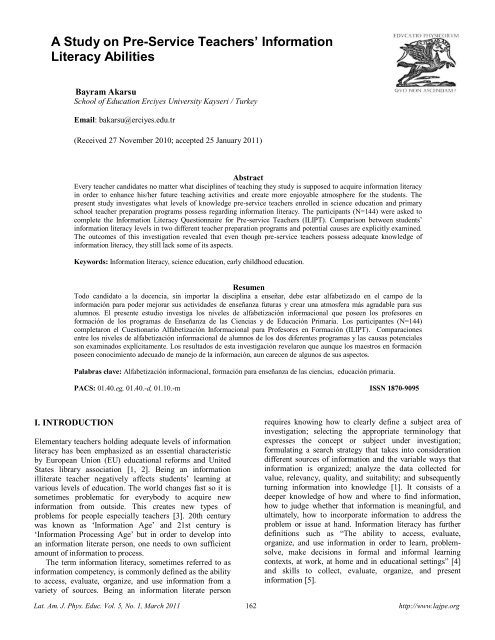
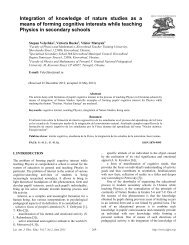
![Diversas formas de visualizar estados en un sistema cuántico [PDF]](https://img.yumpu.com/51151303/1/190x245/diversas-formas-de-visualizar-estados-en-un-sistema-cuantico-pdf.jpg?quality=85)
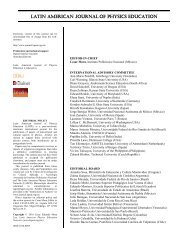
![Precession and nutation visualized [PDF]](https://img.yumpu.com/50786044/1/190x245/precession-and-nutation-visualized-pdf.jpg?quality=85)
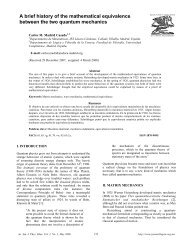
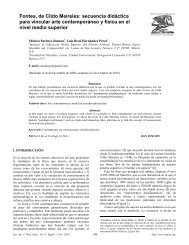
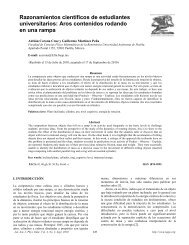
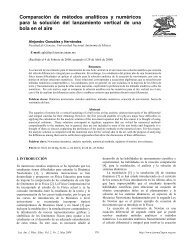
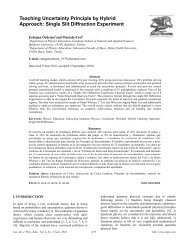
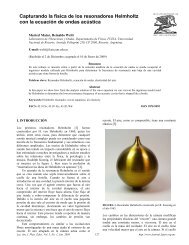
![Index [PDF] - Latin-American Journal of Physics Education](https://img.yumpu.com/47984121/1/190x245/index-pdf-latin-american-journal-of-physics-education.jpg?quality=85)
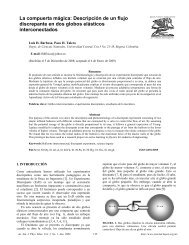
![Flujo de agua en botellas como experimento didáctico [PDF]](https://img.yumpu.com/43536300/1/190x245/flujo-de-agua-en-botellas-como-experimento-didactico-pdf.jpg?quality=85)
